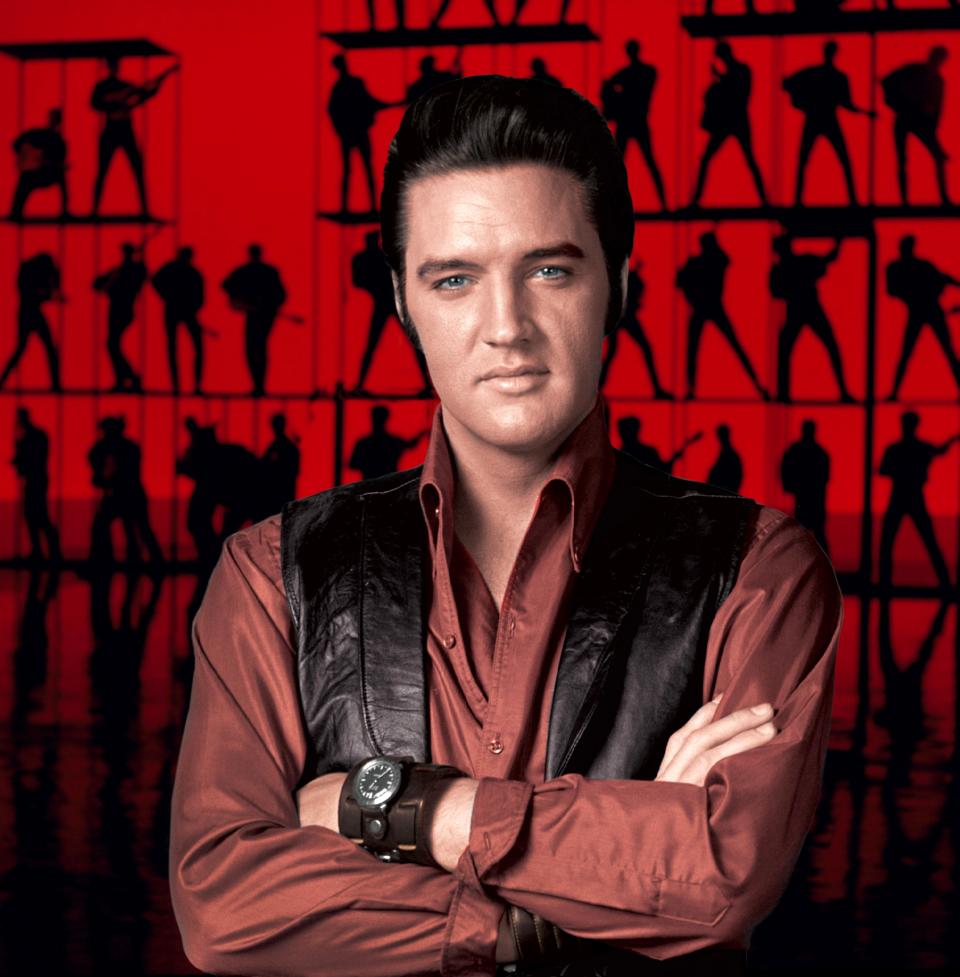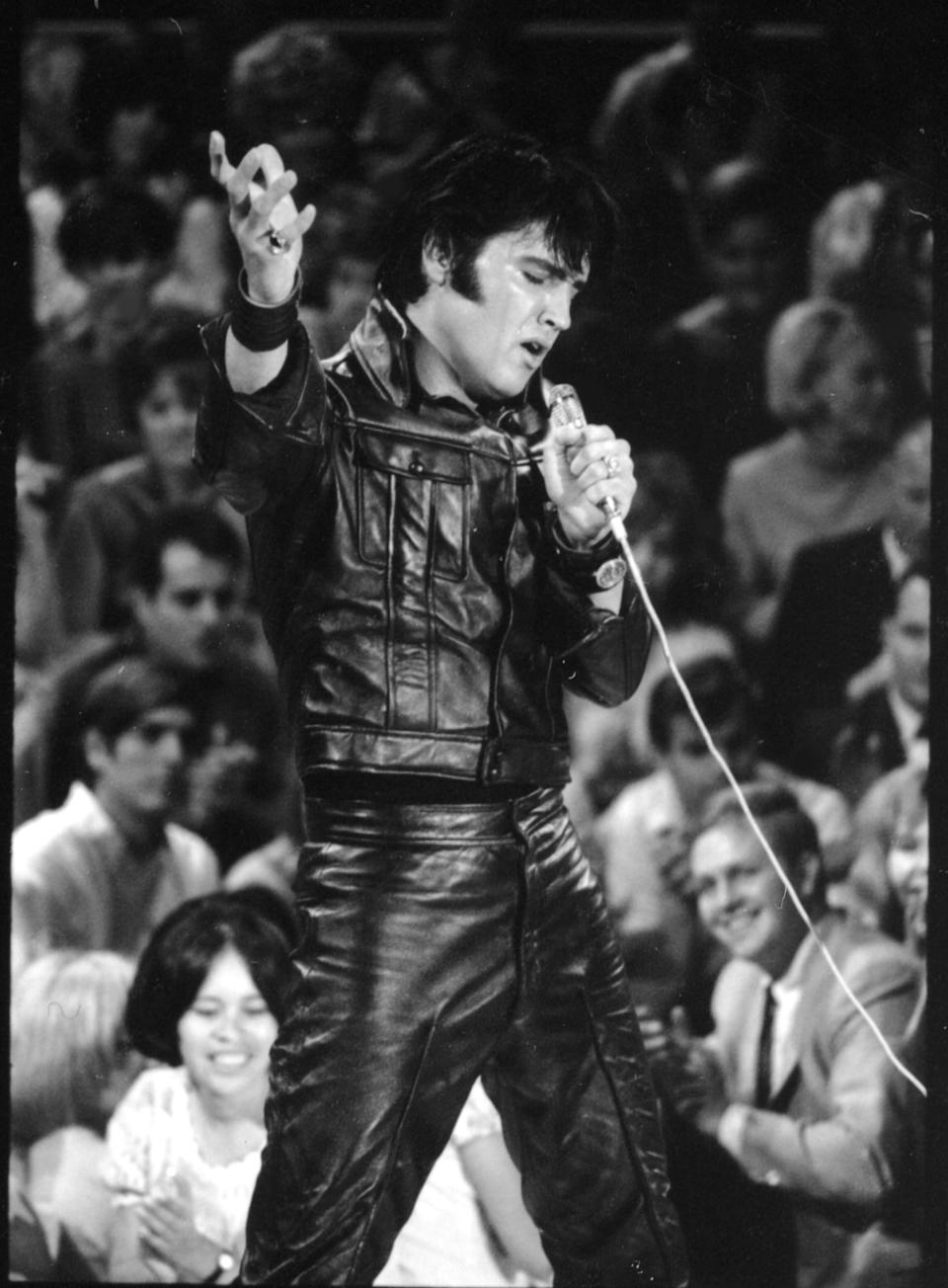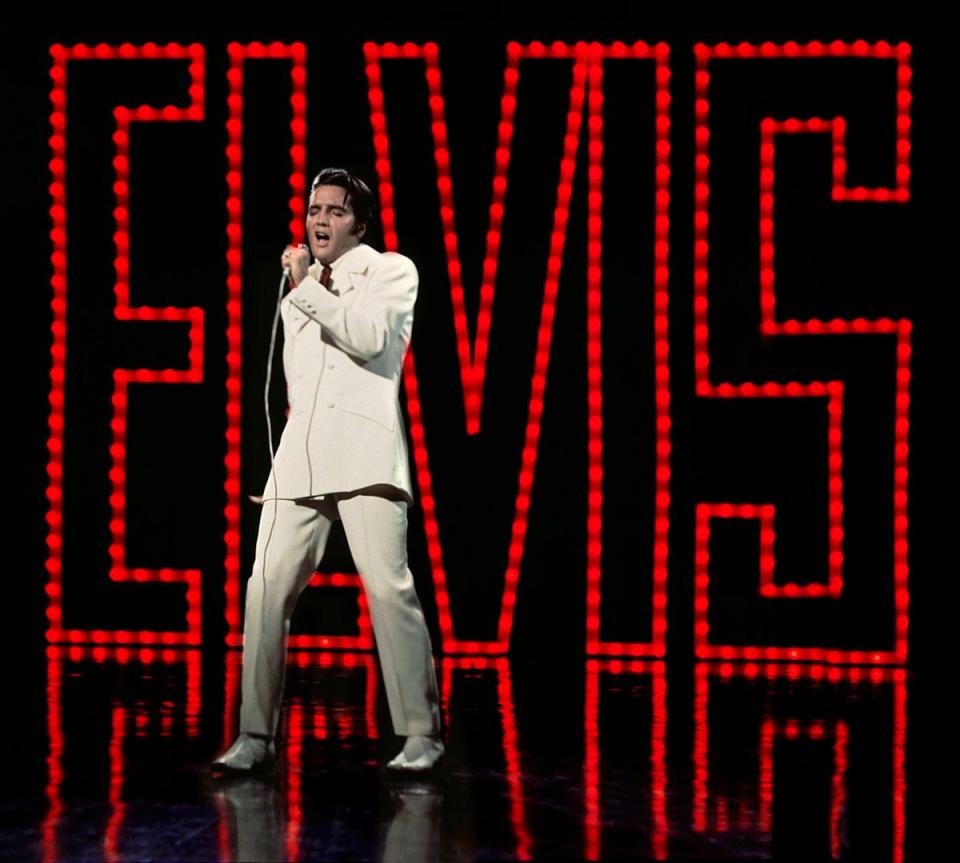'Reinventing Elvis': New doc aims to tell definitive story of '68 Comeback Special
The Memphis newspapers in 1968 did not dedicate extraordinary amounts of ink to the Dec. 3 premiere of the first network television concert special devoted to hometown hero Elvis Presley.
Formally titled "Singer Presents... Elvis," in acknowledgment of the program's sponsor, the Singer sewing machine company, the event now canonically recognized as the "'68 Comeback Special" was treated by The Commercial Appeal and its evening rival, the Memphis Press-Scimitar, as entertainment, not news, with coverage confined to the next day's television pages.
The Commercial Appeal's report appeared in the C section, on Page 30, in the "Dixie Dialing" column devoted to TV.
"One thing is for sure, Elvis still has that old razzamatazz, or is it soul?" wrote columnist Larry Williams, who nonetheless concluded that the show was "designed only for the avid Presley fan." He added that he preferred the Brigitte Bardot special that followed the Elvis show on NBC, because "she is a healthy girl and I suffer from a vivid imagination."

Columnist Mary Ann Lee was more analytical and appreciative in her "TV News and Views" column on Page 34 of the Dec. 4 edition of the Press-Scimitar.
Lee did not use the word "comeback," but she wrote that Elvis, after years of being "barricaded" inside Graceland and within movies that "had no soul," needed to remind people that "he was a natural-born anti-hero before any of us knew the term." The special did just that, Lee wrote, judging that "Elvis worked as hard as a hungry beginner" to deliver "one of the most spine-tingling performances in the history of television."
"Let's admit the truth: He is an artist, an original, a primal force," Lee concluded. "The old and forgotten magic surged back."
History, for the most part, has embraced Lee's favorable assessment of the so-called "'68 Comeback Special." The latest form of this embrace arrives Sunday, July 30, when a new documentary feature film, "Reinventing Elvis: The '68 Comeback," screens in 800-plus cinemas worldwide, including — its only local booking — the Malco Cordova.
Co-produced by MTV Studios, the movie will appear next on the Paramount+ streaming service, where it will debut Aug. 15. The timing is significant: Aug. 15 is the day of the Graceland "Candlelight Vigil" to Elvis' grave, which continues into the early morning of Aug. 16, the date on which Elvis died in 1977, at the age of 42.
Written and directed by John Scheinfeld, who also has fashioned films about such musicians as Herb Alpert and John Coltrane, and produced in part by Steve Binder, original director of the Burbank-based "comeback" special, "Reinventing Elvis" represents an attempt to tell the definitive story of the TV event that has been credited with reviving Elvis' career, thus paving the way for the definitive "mature Elvis" recordings he made at American Studios in Memphis and for his return to the concert stage.
In putting the 1968 special in context, the movie also offers a look at Binder's career as a musical-variety-special innovator, plus a crash course in Elvis history and a dive into the tumult of the late 1960s, when Elvis was in need of rejuvenation after sacrificing his relevance on the altar of Hollywood escapism while such artists as the Beatles, Bob Dylan and Sly and the Family Stone created urgent, vital music.
ELVIS PRESLEY: 45 Elvis events in the 45 years since the death of the King: A year-by-year look
"Reinventing Elvis" also examines Presley's relationship with his manager, "Colonel" Tom Parker. In Baz Luhrmann's recent hit film, "Elvis," Parker (played by Tom Hanks), essentially narrates the Elvis story in a morphine-addled fever dream, musing: "Some would have me the villain in this story." Scheinfeld's film does not recognize the ambiguity suggested by that "some": Its onscreen graphics boldly declare "Steve Binder — the Hero" and "Col. Tom Parker — the Villain." (Elvis is "the Star.") Meanwhile, footage created for the film features an actor as Parker, obscured within a Mephistophelean cloud of smoke, the tip of his cigar glowing like an infernal ember. As Parker biographer Alanna Nash says in the film, Elvis needed a hit special, not only "to regain his footing in the marketplace, but also to save his own soul" (artistically speaking, at least).

Nash gets a good bit of camera time in the 107-minute movie, which also includes interviews with dancers who appeared on the special; fans who were in the audience; singers such as Darius Rucker and Drake Milligan (who played "Elvis" in the made-in-Memphis CMT series, "Sun Records"); and relevant writers. In addition to Nash, these include Gillian Gaar, author of "Return of the King: Elvis Presley's Great Comeback," and Kelefa Sanneh, critic with The New Yorker. (Notably absent, both in front of and behind the camera, are such usual keepers-of-the-Elvis-flame as Priscilla Presley and Elvis associate Jerry Schilling, who have been involved in most other recent major Elvis film and television projects.)
Whatever the other's contributions, Binder's is the lead voice in the documentary. "To me, the importance of the entire special was Elvis Presley rediscovering Elvis Presley," says the director, who was not particularly an Elvis fan until he began to work with the man. The film presents Elvis as a willing collaborator in the process, eager to escape what Nash calls the "parallel universe" of his fanciful movies to reconnect with his audience via music that mattered. The "comeback" special effectively dramatized this music via production numbers that emphasized the singer's rural roots, his rock energy and his gospel sincerity, culminating in the public debut of "If I Can Dream," a song written for Elvis that echoed the "I Have a Dream" speech delivered by Dr. Martin Luther King Jr., who had been assassinated in Presley's hometown eight months prior. Most famously, the special dressed Elvis in tight black leather and reunited him with some of his Sun collaborators for a live-in-the-studio segment that reignited the fiery charisma of his pre-Army years.

As "Reinventing Elvis" points out, the Elvis special was an immediate hit, capturing 42% of the viewing audience to be the top show of the season ("Elvis' special even tops 'Laugh-In'" a Press-Scimitar headline trumpeted). But because it was largely unavailable in the years afterward, the special's significance was not always recognized, making it something of a stealth milestone. It was not until after Elvis' death that the "'68 Comeback Special" began to be reissued, repackaged, revisited, re-edited and reassessed.
The process arguably began in earnest in 1985, when HBO broadcast "Elvis: One Night with You," a new special constructed from the intimate, leather-suited "in-the-round" portion of the 1968 event. A veritable industry of books, soundtracks, home videos and other "Comeback Special" merchandise has followed, boosting recognition of the show's importance.
ELVIS TRIVIA: Think you know everything about the King? Try to answer these questions
That importance was cemented last year in Luhrmann's "Elvis" biopic, which made the contentious behind-the-scenes production of the special the dramatic centerpiece of its Faustian tug-of-war between the frustrated Elvis and the control-freak Parker. The result of all this attention is that the "'68 Comeback Special" may have replaced the epochal "Sun sessions" — the 1954 Memphis recordings that represent the "Big Bang" of rock 'n' roll — as the most familiar moment of Elvis' career, with the singer's black leather TV outfit rivaling the Las Vegas jumpsuit as the iconic Elvis costume.
However familiar the material, "Reinventing Elvis" — packed with archival footage and new commentary — aims to be the last word on the subject, at least for a while. There is a certain urgency to this mission: Binder appears remarkably fit, but he is 90 years old.
Elvis, meanwhile, remains everlasting. "We're all influenced by Elvis," says Rucker, in the film. "We may not know it, but we are."
'Reinventing Elvis: The '68 Comeback'
July 30: 7 p.m., Malco Cordova Cinema, 1080 N. Germantown Parkway. Tickets at malco.com.
Aug. 15: Available to stream on Paramount+.
This article originally appeared on Memphis Commercial Appeal: 'Reinventing Elvis: The '68 Comeback': A look at the new documentary
